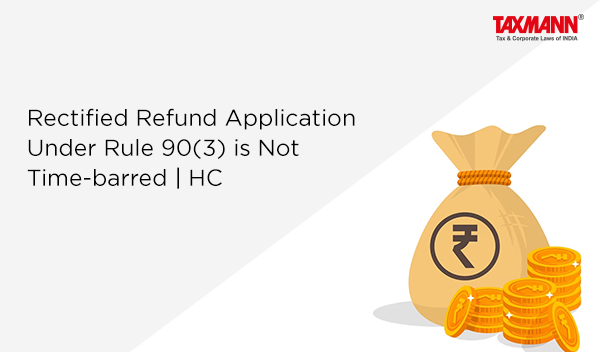Rectified Refund Application Under Rule 90(3) is Not Time-barred | HC
- Blog|News|GST & Customs|
- 2 Min Read
- By Taxmann
- |
- Last Updated on 18 November, 2023

Case Details: Global Health Ltd. v. Union of India - [2023] 156 taxmann.com 375 (Punjab & Haryana)
Judiciary and Counsel Details
-
- Ms Ritu Bahri & Mrs Manisha Batra, JJ.
- Rohit Sud, Adv. for the Petitioner.
- Vaibhav Gupta for the Respondent.
Facts of the Case
The petitioner is engaged in providing healthcare service. While filing Form GSTR-3B, the petitioner had mistakenly paid the excess amount of SGST under reverse charge mechanism, though the liability for same was comparatively less. Thereafter, the petitioner filed a refund application in terms of the provisions of the GST law.
The department issued deficiency memo in Form GST RFD-03. Notably, as per Rule 90(3) of the CGST Rules, once the proper officer communicates the deficiencies noticed to the applicant in Form GST RFD-03, the applicant is required to file a fresh refund application post rectification of the deficiencies. Thus, in this case, the petitioner also filed the second refund application after rectifying/clarifying the deficiencies raised in the deficiency memo.
The Department rejected the second refund application by holding it as time barred. Thereby, the petitioner filed a writ petition before the High Court.
High Court Held
The High Court placed its reliance on the Delhi High Court order in the case of BSNL v. Union of India [W.P. (C) No. 3550/2023], where it was held that Rule 90(3) of the CGST Rules cannot be applied in a manner that it renders refund application filed by taxpayer as non est. The High Court held that the second application filed by the petitioner, after removing the deficiency, could not have been rejected on the ground that it was time barred.
Disclaimer: The content/information published on the website is only for general information of the user and shall not be construed as legal advice. While the Taxmann has exercised reasonable efforts to ensure the veracity of information/content published, Taxmann shall be under no liability in any manner whatsoever for incorrect information, if any.

Taxmann Publications has a dedicated in-house Research & Editorial Team. This team consists of a team of Chartered Accountants, Company Secretaries, and Lawyers. This team works under the guidance and supervision of editor-in-chief Mr Rakesh Bhargava.
The Research and Editorial Team is responsible for developing reliable and accurate content for the readers. The team follows the six-sigma approach to achieve the benchmark of zero error in its publications and research platforms. The team ensures that the following publication guidelines are thoroughly followed while developing the content:
- The statutory material is obtained only from the authorized and reliable sources
- All the latest developments in the judicial and legislative fields are covered
- Prepare the analytical write-ups on current, controversial, and important issues to help the readers to understand the concept and its implications
- Every content published by Taxmann is complete, accurate and lucid
- All evidence-based statements are supported with proper reference to Section, Circular No., Notification No. or citations
- The golden rules of grammar, style and consistency are thoroughly followed
- Font and size that’s easy to read and remain consistent across all imprint and digital publications are applied



 CA | CS | CMA
CA | CS | CMA
